Boston's LGBTQ+ History: Notable Boston Creatives
Local LGBTQ+ Authors & Creatives
This page is a list of notable authors, artists, and other creators with a connection to Boston and its surrounding communities.
Boston (and Greater Boston) LGBTQ+ Writers
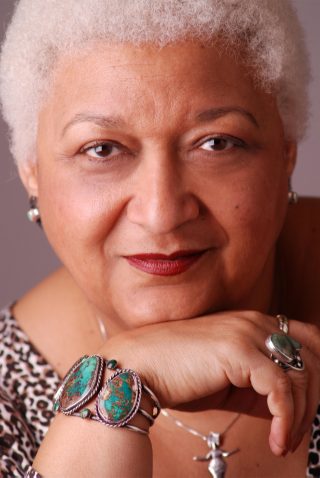 Jewelle Gomez (1948 – )
Jewelle Gomez (1948 – )
Born in Boston, Gomez is a writer, activist, and author of the double Lambda Award-winning novel, The Gilda Stories (1991). She is also a poet, essayist, and short story writer. More of her work can be found in anthologies such as Black From the Future: a Collection of Black Speculative Writing (2019) and The Persistent Desire: a Femme-butch Reader (1992).
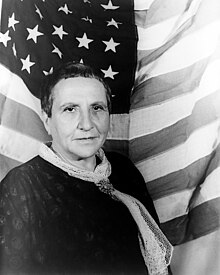 Gertrude Stein (1874 – 1946)
Gertrude Stein (1874 – 1946)
Though claimed by other cities as well, Gertrude Stein attended Harvard University and spent a summer in Wood's Hole, Massachusetts. Stein was an American novelist, poet, playwright, and art collector. She is remembered for her impact on culture and on the LGTBQ community. Some of her books include Tender Buttons (1914) and The Autobiography of Alice B. Toklas (1933).
Michael McEachern McDowell (1950 – 1999)
Michael McDowell attended Harvard College and Brandeis University and lived in Medford, Massachusetts. McDowell was an American novelist and screenwriter described by author Stephen King as "the finest writer of paperback originals in America today." He died in 1999 from AIDS-related illness. He wrote under the pen name Nathan Aldyne (amongst others) writing The Valentine and Lovelace detective novels. He is best known for writing the screenplay for Tim Burton's Beetlejuice (1988).
David B. Feinberg (1956 – 1994)
Feinberg was born in Lynn, Massachusetts and attended MIT as an undergraduate. He was a novelist and essayist winning the Lambda Literary Award for Gay Men's Fiction and the American Library Association Gay/Lesbian Award for Fiction for his novel Eighty-Sixed (1989). He is noted for his writing and his AIDS activism. His final book, Queer and Loathing: Rants and Raves of A Raging AIDS Clone, was published soon after his death due to complications from AIDS.
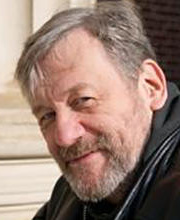 Michael Bronski (1949 – )
Michael Bronski (1949 – )
Bronski has lived in Cambridge, Massachusetts since 1971. He is currently a professor at Harvard University and is best known for his 2011 book A Queer History of the United States. He has won numerous awards for LGBTQ activism and scholarship, including the prestigious Publishing Triangle's Bill Whitehead Award for Lifetime Achievement.
 Steve Buckley (1956 – )
Steve Buckley (1956 – )
Buckley is a journalist and sports writer. He previously wrote for the Boston Herald, the Westfield Evening News, and Boston Magazine as well as other publications outside the Greater Boston area. Born in Cambridge, he currently resides in Somerville and writes for The Athletic. His other achievements include: organizing the annual Cambridge event The Old Time Baseball Game, hosting the podcast Two Outs which discussed LGBTQ+ issues in sports, and authoring The Best Boston Sports Arguments and Wicked Good Year.
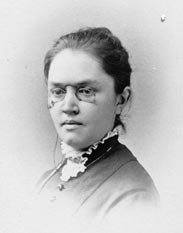 Katharine Lee Bates (1859 – 1929)
Katharine Lee Bates (1859 – 1929)
Bates was an American author, poet, and social activist. She is assumed to have been in a relationship with Katharine Coman. Both were professors at Wellesley College. Bates is most famous for writing the song "America the Beautiful". She also wrote America the Dream, and From Gretna Green to Land's End, amongst other publications.
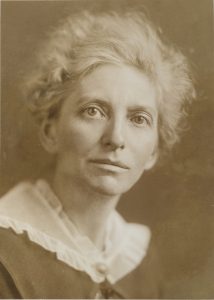 Edith Guerrier (1870 – 1958)
Edith Guerrier (1870 – 1958)
One of BPL's own, Edith Guerrier was a librarian, author, and educator. She ran the "Saturday Evening Girls" reading and writing clubs for young immigrant women out of the North End Branch Library and later became the supervisor for all BPL branches in the 1920s. She lived together with her longtime companion Edith Brown in a house in Brighton. She wrote An Independent Woman: the Autobiography of Edith Guerrier, and Wanderfolk in Wonderland a Book of Animal Fable Stories, and more.
F.O. Matthiessen (1902 – 1950)
Harvard literary critic F.O. Matthiessen and New England painter Russell Cheney embarked upon a two decade long relationship in the mid 1920s.While they never publicly disclosed their relationship, they were open about it with their close friends and wrote about it in their letters, a collection of which are available at the BPL. Matthiessen's critical works were supplemented by left wing political activism. Potentially still devastated by Cheney's death due to illness in 1945 and afraid of being victimized by the growing Red Scare in American politics, Matthiessen committed suicide in 1950. (Left: F. O. Matthiessen with Pansy Littlefield, painted by Russell Cheney, 1926)
Brian McNaught (1948 – )
McNaught served as Boston's Mayor's Liaison to the Gay and Lesbian Community from 1982 to 1984, the first such full time position in the country. While working for Bosotn, McNaught created the first city task force on AIDS. He wrote several books on the subject of LGBTQ+ life and civil rights. McNaught is considered one of the world’s leading corporate diversity consultants dealing with lesbian, gay, bisexual, transgender, and queer issues in the workplace. BPL holds his books and government documents.
 Porsha Olayiwola (1988 – )
Porsha Olayiwola (1988 – )
Olayiwola earned her MFA in poetry from Emerson College and is the City of Boston's current Poet Laureate. She is the founder of the Roxbury Poetry Festival and was the 2021 Artist-in-Residence at the Isabella Stewart Gardner Museum. Her book I Shimmer Sometimes Too is available at BPL. Her work examines historical and current issues in the Black, woman, and queer diasporas.
Angelina Weld Grimké (1880 – 1958)
Grimké was a poet, playwright, and journalist born in Boston to a biracial family. She is noted for being one of the first Black American women to have a play publicly performed. Though to modern knowledge Grimké never came "out" in today's sense of the word, there is strong evidence in her writing and letters that she was lesbian or bisexual.
 Elizabeth Bishop (1911 – 1979)
Elizabeth Bishop (1911 – 1979)
Bishop was a pulitzer prize winning poet and short-story writer. She was born in Worcester, Massachusetts and died in Boston. According to the State Library of Massachusetts, "She avoided personal and confessional themes in her poetry and labels such as 'female poet' or 'lesbian poet' as she wanted to be considered based on the quality of her writing, not on her gender or sexual orientation. Her published works are available at BPL and our Special Collections.
 Michelle Tea (1971 – )
Michelle Tea (1971 – )
Tea was born in Chelsea, Massachusetts and moved to Boston as a teenager to live with her girlfriend. She has earned awards from LAMBD and PEN/America and is also the recipient of the Rona Jaffe Awards, and a 2021 Guggenheim Fellow. Her many publications are available at BPL as books, ebooks, and audiobooks.
Paul Monette (1945 – 1995)
Monette was born in Lawrence, Massachusetts. He moved to Boston as a young adult where he taught at Milton Academy. He later moved to Los Angeles with his longtime partner, Roger Horwitz, in 1977, where he became active in the city’s gay rights movement. "Frequently elegiac, Monette’s poems narrate the trauma and pain of the AIDS crisis" (Poetry Foundation). He died of complications from HIV/AIDS. Monette's influential publications can be found at BPL.
 The Boston Collection of Women's Poetry by Publication Date: 1984An Anthology of Poetry by Women Who Participated in the Gay/Feminist Poetry Contest 1983 Sponsored by Brush Hill Press, Boston, Massachusetts
The Boston Collection of Women's Poetry by Publication Date: 1984An Anthology of Poetry by Women Who Participated in the Gay/Feminist Poetry Contest 1983 Sponsored by Brush Hill Press, Boston, MassachusettsRace, Class, and Gender by
Publication Date: 2000Race, Class, and Gender includes interdisciplinary articles that show how race, class, and gender shape people's experiences.
Patricia Hill Collins is a sociology academic. She attended Brandeis University and Harvard University and taught at Tufts University. Coming Out, Becoming Ourselves Lesbian Stories From the Boston Daughters of Bilities, 1969-1999 by Publication Date: 2024Twenty-one lesbians living in the Boston area tell their stories of growing up in turbulent times, when they learn to mostly hide from their true selves, but eventually become brave enough to declare who they are and who they love in the safe space of the Boston Daughters of Bilitis (DOB).
Coming Out, Becoming Ourselves Lesbian Stories From the Boston Daughters of Bilities, 1969-1999 by Publication Date: 2024Twenty-one lesbians living in the Boston area tell their stories of growing up in turbulent times, when they learn to mostly hide from their true selves, but eventually become brave enough to declare who they are and who they love in the safe space of the Boston Daughters of Bilitis (DOB).
Other Artists & Creators from (Greater) Boston
 Christian Walker (1953 – 2003)
Christian Walker (1953 – 2003)
Walker was a photographer and critic born in Springfield Massachusetts. In the 1970s he moved to Boston. He graduated from Tufts University where his work was later exhibited. They describe Walker: "Walker’s artworks, criticism, and exhibition-making addressed myriad subjects including queer public sex, interracial intimacy, HIV/AIDS, censorship, drug use, and Blackness and whiteness in public and private image cultures. Many articles were written about him in the magazine Aperture, which you can read via BPL.
 Russell Cheney (1881 – 1945)
Russell Cheney (1881 – 1945)
Cheney was an American Impressionist and Post-Impressionist painter. His relationship with Harvard literary critic F.O. Matthiessen is of renown. While they never publicly disclosed their relationship, they were open about it with their close friends and wrote about it in their letters, a collection of which are available at the BPL. Cheney's art has been displayed at the Museum of Fine Arts, Boston.
 Stephin Merritt (1965 - )
Stephin Merritt (1965 - )
Merritt is best known for being one of the principal singers in The Magnetic Fields, a band formed in Boston. He attended high school in Massachusetts and returned to Boston after attending NYU. Merritt is lauded for his lyrics and praised for the references he makes to gay love in his music. In addition to The Magnetic Fields, Merritt is also a solo artist and published a book of poetry, 101 Two-letter Words.
 Boston Gay Men's Chorus
Boston Gay Men's Chorus
Founded in 1982, BGMC sings a wide spectrum of classical and popular music and creates social change by providing a positive, affirming image of the LGBTQ+ community. BPL hosts many of BGMC's videos, recordings, posters, and more via Digital Commonwealth.
| Athlete Name | Sport | Relationship to Boston | Other Achievements |
|---|---|---|---|
| Brendan Burke (1988 - 2010) | Ice Hockey | Lived in Boston | |
| Caitlin Cahow (1985-) | Ice Hockey | Played for the Boston Blades, attended Boston College Law School | Olympian |
| Alex Carpenter (1994-) | Ice Hockey | Born in North Reading, attended and played for Boston College, played for the Boston Pride | Olympian |
| Julie Chu (1982-) | Ice Hockey | Attended and played for Harvard | Olympian |
| Jason Collins (1978-) | Basketball | Played for the Boston Celtics | Time Magazine's "100 Most Influential People in the World" in 2014 |
| Meghan Duggan (1978-) | Ice Hockey | Born in Danvers, played for the Boston Blades and Boston Pride, | Olympian |
| Jan-Michael Gambill (1977-) | Tennis | Played for the Boston Lobsters | |
| Andrew Goldstein (1983-) | Lacrosse | Born in Milton; Played for the Boston Cannons | Inducted into the inaugural class of the National Gay and Lesbian Sports Hall of Fame |
| Derrick Gordon (1991-) | Basketball | Attended and played for University of Massachusetts, Amherst | |
| Angela Hucles (1978-) | Soccer | Played for the Boston Breakers and Boston Renegades | Olympian |
| Hilary Knight (1989-) | Ice Hockey | Played for the Boston Fleet, Boston Pride, and Boston Blades | Olympian |
| Joanna Lohman (1982-) | Soccer | Played for the Boston Breakers | Wrote the book Raising Tomorrow's Champions: What the Women's National Soccer Team Teaches Us About Grit, Authenticity and Winning |
| Harriet Metcalf (1958-) | Row | Attended Mount Holyoke and Harvard University | Founded G-ROW Boston, a rowing program for girls in the Boston public schools; Olympian |
| Kristie Mewis (1991-) | Soccer | From Weymouth, attended Boston College, Played for the Boston Breakers | Olympian |
| Ryan O'Callaghan (1983-) | Football | Played for the New England Patriots | |
| Kelley O'Hara (1988-) | Soccer | Played for the Boston Breakers | Olympian |
| Dave Pallone (1951-) | MLB Umpire | From Waltham, MA | |
| Tom Waddell (1937-1987) | Decathlete | Attended Springfield College | Olympian; Founder of the Gay Olympics |
Ayo Edebiri
Edebiri was born in Boston, grew up in Dorchester, and attended Boston Latin School. She is most famous for her role in the TV series The Bear, for which she has won a Golden Globe Award, a Screen Actors Guild Award, and a Primetime Emmy Award. She identifies as queer.
